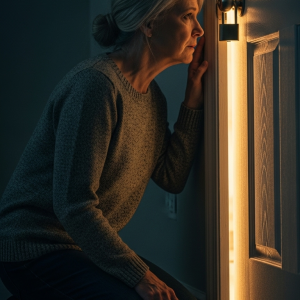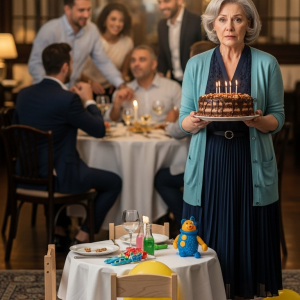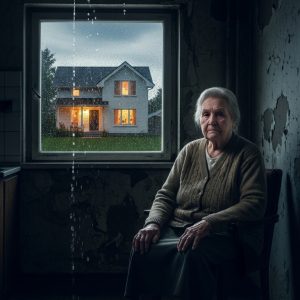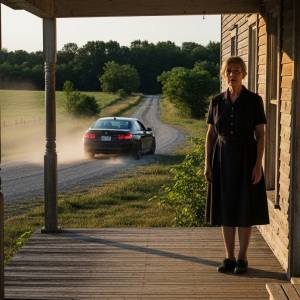The auditorium buzzed with excitement. I smoothed down my dress, the nicest one I owned, my hands trembling slightly as I checked my appearance in my compact mirror. At sixty-five, the years of working three jobs had etched deep lines around my eyes, but today, they crinkled with pride.
Twenty-eight years of sacrifice had led to this moment. When Oliver was born, I promised he would have the opportunities I never did. His father left when he was only five, leaving behind nothing but unpaid bills and broken promises. I still remember that night, sitting at our kitchen table after Oliver was asleep, calculating how I could possibly make ends meet. That was the night I decided I would do whatever it took.
The years blurred together after that—early mornings cleaning offices, days as a receptionist, and evenings waiting tables. My body ached constantly, but the thought of Oliver in his white coat kept me going. When he was accepted to medical school, it was the happiest day of my life.
Now, as the ceremony began and the graduates filed in, I searched for my son. When I spotted him, my heart swelled. He looked so handsome, so accomplished. I’d done it. Despite all the odds, I had helped my son achieve his dream.
After the ceremony, I pushed through the crowd, eager to congratulate him. I spotted Oliver surrounded by a group of well-dressed families. I waved, catching his eye. The smile he gave me wasn’t the one I’d expected. It was brief, almost embarrassed.
“Oliver!” I called, reaching out to hug him.
He stepped back slightly, maintaining a careful distance. “Mom. Hi. You made it.”
Something felt wrong. Before I could respond, a sleek, elegant woman approached, placing her hand possessively on Oliver’s arm. “Darling, aren’t you going to introduce me?” she asked, her voice smooth as silk.
Oliver’s face lit up in a way it hadn’t when he’d seen me. “Everyone, this is Amber,” he announced proudly. Then came the words that shattered my world. “This is my mother. The woman responsible for who I am today.”
The group murmured appreciatively. I stood frozen, invisible. Amber smiled graciously, accepting their praise without a word of correction. One of Oliver’s friends then turned to me with a puzzled expression. “And you are?”
I opened my mouth, but no words came out. Oliver glanced at me, then quickly said, “This is Holly. She’s a family friend. She’s been very supportive.”
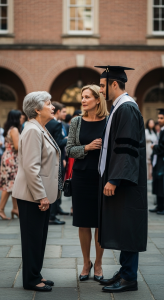
A family friend. Twenty-eight years of sacrifice, reduced to a family friend. The world seemed to tilt beneath my feet. I looked at Oliver, my son, my whole world, standing there with his arm around a stranger he called “mother.” In that moment, I felt something inside me break. But also, something else ignite.
I took a deep breath and stepped forward. “Actually,” I said, my voice steadier than I expected, “I have something important to say.” All eyes turned to me. Oliver’s face paled.
“Actually,” I repeated, my voice growing stronger, “I’m Oliver’s mother. His biological mother.”
The silence was deafening. “Holly,” Oliver said through gritted teeth, “perhaps we should discuss this privately.”
“I think we’re well past privacy, don’t you?” I replied, surprised by my own boldness. “For twenty-eight years, I’ve been washing dishes and scrubbing floors to put you through school. My hands are rough and my back is bent, but I made sure you never went without. I won’t be erased. Not today.”
Amber cleared her throat. “Oliver has been living with his father and me since he was seventeen. We’ve supported him through college and medical school.”
“Supported him?” I couldn’t help but laugh, though there was no humor in it. “With what? The money I sent every month? The loans I’m still paying off?”
I reached into my worn purse and pulled out a small, folded piece of paper. “Do you remember this?” I asked Oliver. I unfolded a crayon drawing of a stick figure in a doctor’s coat. Above it, in a child’s uneven handwriting, it read: When I’m a doctor I will buy my mom a big house so she doesn’t have to work anymore.
“I kept it all these years,” I said softly. “It got me through the hardest days.”
The group had fallen completely silent. Then, Oliver did something unexpected. He stepped away from Amber and moved toward me. “Mom,” he said, his voice breaking, “I’m so sorry.”
“I need to know why,” I said, my voice gentle but firm. “Why would you introduce her as your mother? Why reduce me to a family friend?”
Oliver’s answer stunned me. “Because I was ashamed,” he whispered. The words hit me like a physical blow
“Ashamed of me?”
“Not of you, exactly,” he said, looking down. “Of where I came from. Of our tiny apartment, your three jobs, of how hard everything was. These people,” he gestured to his friends, “they come from money, from prestige. I just… I wanted to belong.”
“So you borrowed someone else’s mother?” I asked, my voice barely audible.
“Amber and Richard took me in,” he explained. “They gave me a room in their mansion, introduced me to the right people. It was so much easier than… our life. I wanted to be someone else.”
Before Oliver could say more, a distinguished man in an expensive suit approached, clapping him on the shoulder. “Richard Mitchell,” he said, extending a hand to me. “You must be one of Oliver’s instructors.”
Before I could respond, Amber placed a hand on her husband’s arm. “Richard, this is Holly. Oliver’s mother.”
Richard’s smile faltered. “His mother? But I thought…”
Oliver finally looked up, his expression unreadable. “Richard, there’s something you need to know. Something I’ve never told you or Amber. When my father reached out to you eight years ago, he didn’t tell you the whole truth.”
Richard frowned. “Your father and I were college roommates. He told me you needed a place to stay.”
“That was true,” Oliver said. “But Dad didn’t reach out because he cared about me. He reached out because he needed money.”
For the next hour, the painful story tumbled out. Oliver confessed that his father, Harrison, had reappeared in his life only to use him as a pawn to extract money from the Mitchells. Harrison had manipulated his son, convincing him to ask for extra funds for “expenses,” which Harrison would then take for his gambling debts.
“I never told my mom,” Oliver admitted, tears streaming down his face. “I was embarrassed, and I didn’t want her to know I was in contact with Dad again. And then… I started to enjoy the life you offered. The nice house, the connections. I started to resent you, Mom, not because you did anything wrong, but because you reminded me of everything I was trying to escape.”
Richard and Amber listened, their expressions shifting from confusion to horror, then to a deep, quiet sadness. “We want you both to come to dinner tomorrow night,” Richard said finally, his voice firm but not angry. “There’s a lot we need to discuss. But the most important thing is that we move forward, honestly.”
As they walked away, Oliver turned to me. “Mom, there’s more.” On a quiet bench, he told me the rest. He confessed that on the night his father left, Harrison had knelt down to him, a five-year-old boy, and whispered, “Your mother is the reason we’re poor. She’s going to keep you down, just like she did to me.”
That poison had stayed with him for years, making him vulnerable to his father’s manipulation when he reappeared. The dinner the next evening was tense. As we sat in the Mitchells’ sunroom, the doorbell rang. It was Harrison.
“Richard! Amber!” he exclaimed, all false charm. Then he saw me. “Holly. What are you doing here?”
“She’s here because she’s Oliver’s mother,” Richard said coldly. “His real mother, in every way that matters.”
The confrontation was brutal. Harrison’s charm quickly vanished, replaced by vicious accusations. When cornered about the financial fraud, he played his final, desperate card.
“Speaking of responsibility, Holly,” he sneered, “why don’t you tell them your little secret? The real reason I left. Holly had an affair. With my best friend. That’s why I left. Because she betrayed me first.”
I took a deep breath, the weight of a secret I’d carried for decades finally lifting. “Harrison and I were already separated when I met Thomas,” I explained calmly. “He had walked out on us three months prior after emptying our bank account. Thomas was kind, stable. I fell in love with him. Then your father came back, found out, and threatened to take you away from me, claiming I was an unfit mother. I was terrified. I ended things with Thomas to protect you, Oliver. A week later, your father left again anyway. For good.”
Amber looked at Harrison with undisguised contempt. Richard stood up. “I think it’s time for you to leave,” he said. “Now. Before I call the police.”
Harrison’s bravado crumbled. Without another word, he turned and stormed out.
In the quiet that followed, something shifted. The painful truth had cleared the air. Richard and Amber made it clear that while they were hurt by the deception, they understood the manipulation Oliver had endured. They wanted a fresh start, with all of us.
“Holly,” Amber said, turning to me, genuine remorse in her eyes, “we owe you an apology. We unwittingly played a part in causing you pain. I run a foundation that supports medical care in underserved communities. We need someone to coordinate our volunteer program. Someone organized, hardworking, and who understands sacrifice. Would you be interested?”
I stared at her, shocked. “Me? But I don’t have the qualifications…”
“You raised a doctor while working three jobs,” she interrupted with a smile. “I’d say your qualifications are beyond impressive.”
Three months later, I stood in the lobby of a new community clinic, the first project I had coordinated for the foundation. The door swung open, and Oliver walked in, wearing a white coat with “Dr. Oliver Ganon” embroidered on the pocket. He had decided to use my last name professionally.
He hugged me, and we walked over to where Richard and Amber were chatting. As cameras flashed to capture the clinic’s opening, Oliver put his arm around my shoulders.
“This is my mother, Holly Ganon,” he announced proudly to everyone present. “Everything I am today, I owe to her.”
And this time, no one questioned who I was.
The next six months settled into a rhythm that was both comfortable and wonderfully new. Sundays became a tradition. We would gather at the Mitchells’ estate—Oliver, myself, Richard, and Amber—not as hosts and guests, but simply as family. We’d sit in the sunroom, the same room where so many painful truths had been revealed, and it now felt like a place of healing.
During one of these peaceful afternoons, as Richard explained the finer points of a chess move to me, Oliver looked up from the medical journal he was reading. “Mom,” he said, his tone thoughtful. “I’ve been thinking a lot lately. About what you said at the house. About Thomas.”
I paused, a chess piece hovering in my hand. We had not spoken of him since that night. I assumed the chaos of everything else had pushed the thought from his mind. “What about him?” I asked, my voice carefully neutral.
“You gave up your chance at happiness for me,” Oliver said, his gaze direct and unwavering. “For decades, your life was about my future. I think… I think you deserve to know what happened to your past. We should try to find him.”
Amber, who had been quietly reading nearby, lowered her book. She looked at me with a gentle, understanding expression. Richard stopped the chess lesson and simply watched, his support silent but palpable. The idea sent a tremor of fear and something else—a long-dormant curiosity—through me. “Oliver, that was a lifetime ago. He has his own life.”
“Maybe,” Oliver said, standing and walking over to my chair. “But don’t you want to know? Don’t you deserve to close that chapter, one way or another?” He was no longer the boy trying to escape his past; he was a man trying to help his mother heal hers.
The search was surprisingly quick. Richard, with his legal resources and quiet efficiency, treated it like a personal mission. It was his way of showing that his support extended beyond Oliver, to me. Within a week, he had information.
Thomas Albright. He had become a successful architect before retiring five years ago. He had married, a happy union of twenty years, but his wife had passed away from an illness three years prior. He had no children of his own, but two step-daughters who were grown and lived out of state. He lived quietly, in a small coastal town about a three-hour drive away.
Oliver presented the information to me one evening in my small, comfortable apartment. He had brought takeout from my favorite Thai restaurant, a simple gesture that meant the world. As he laid out the details on my kitchen table, I felt a wave of conflicting emotions. Relief that he was alive and had found happiness. A pang of sadness for the life we never had.
“He’s a widower,” I whispered, the words feeling foreign on my tongue.
Oliver nodded. “He lives alone, Mom. Richard’s contact said he’s well-respected in his community, known for being kind and generous.” He looked at me, his eyes full of a new maturity. “You told me love isn’t about deserving. But you deserve this. You deserve to see him, if you want to. The least I can do is help you see if there’s still a chapter left to write.”
I looked at the printed-out address on my table, at the picture of a modest, well-kept house with a garden in the front. For thirty years, I had closed the door on that part of my life, believing it was a necessary sacrifice. Now, my son was holding the key, asking me if I was brave enough to open it.
Oliver insisted on driving me. The three-hour journey was filled with a nervous quiet, punctuated by his gentle questions about the past. For the first time, I spoke freely about Thomas—about his kindness, his steady presence, the way he had made me laugh during the darkest time of my life.
The coastal town was charming, smelling of salt and sea air. We found the house easily. It was just as the picture had shown, with blooming roses lining the walkway. I took a deep breath, my heart pounding in my chest, and walked to the door. Oliver stood back by the car, giving me my space.
I knocked, and a moment later, the door opened. He was older, of course, his hair completely silver, but his eyes were the same. Kind, intelligent, and full of a warmth I remembered instantly. He looked at me, his brow furrowed in confusion for a split second, and then, a slow wave of recognition washed over his face.
“Holly?” he whispered, his voice raspy with disbelief. “Holly Ganon? After all these years… I never thought I’d see you again.”
“Thomas,” I breathed, feeling thirty years of unspoken words caught in my throat. “I didn’t know if I should come.”
“I’m glad you did,” he said, a gentle smile forming. He opened the door wider. “I’ve thought about you and that little boy often over the years. I always hoped you were both okay.”
As if on cue, Oliver walked up the path. “I am, sir. Thanks to her.”
Thomas’s gaze shifted to my son, taking in the confident, well-dressed young man. He looked from Oliver back to me, and his smile widened with genuine delight. “My goodness,” he said warmly. “This is Oliver?”
“Dr. Oliver Ganon now,” Oliver said, extending his hand. “It’s an honor to finally meet you, Mr. Albright.”
Thomas shook his hand firmly, his eyes shining as he looked at me. “Your mother was so incredibly proud of you, even then. I see she had every reason to be.” His words, a simple validation from an almost-stranger, felt like a balm on wounds I didn’t even know were still so raw.
We sat in his sun-filled living room for over an hour, drinking tea and bridging the gap of three decades. It wasn’t a dramatic, cinematic reunion. It was quiet, a little awkward at first, but deeply, profoundly healing. He spoke of his late wife with love and respect, and I spoke of my journey with Oliver. There was no bitterness, only a shared, unspoken understanding of lives lived and choices made.
When it was time to leave, Thomas walked us to the door. “Please don’t let this be the last time, Holly,” he said. “Perhaps we could have coffee next week? There’s a lot to catch up on.”
“I’d like that very much,” I replied, my smile feeling more natural than it had in years.
On the drive home, a comfortable silence filled the car. I watched the coastline blur past my window, a sense of peace settling over me. Oliver glanced over, a soft smile on his face. He didn’t need to say anything; he could see the change in me. The tight knot of old grief and what-ifs that I had carried for so long had finally begun to unwind.
I had spent the majority of my life fighting for my son’s future, ensuring he had every opportunity to succeed. Now, with his encouragement and the support of our strange and wonderful new family, I was finally reclaiming my own past. The story wasn’t over. A new, unwritten chapter was just beginning.
